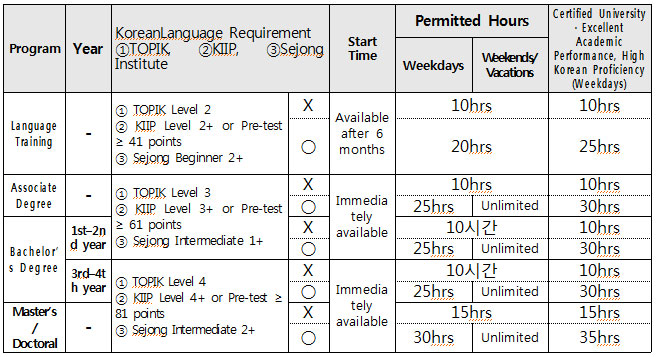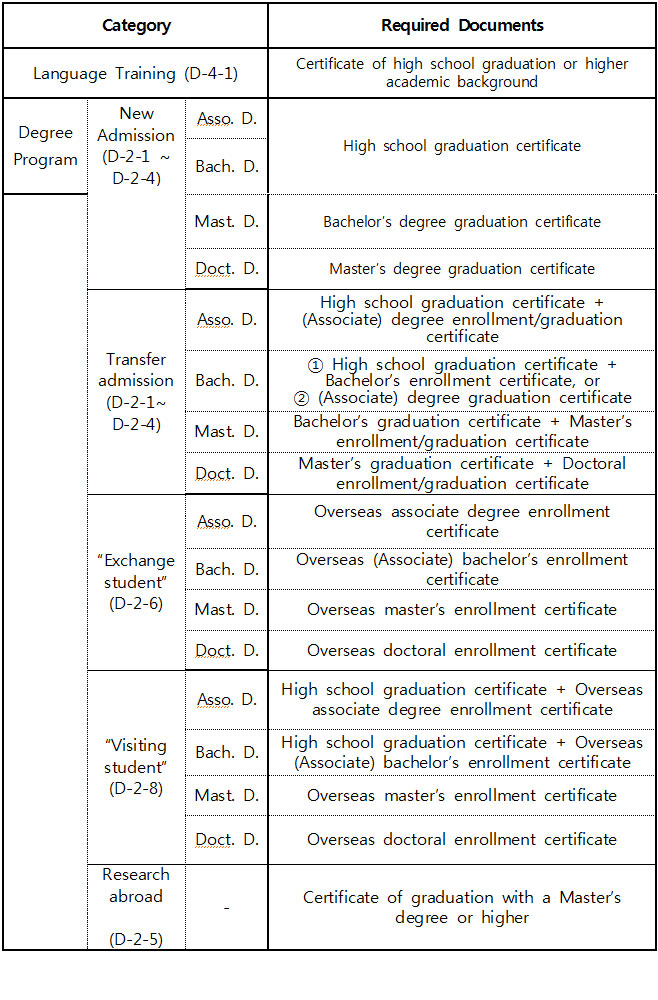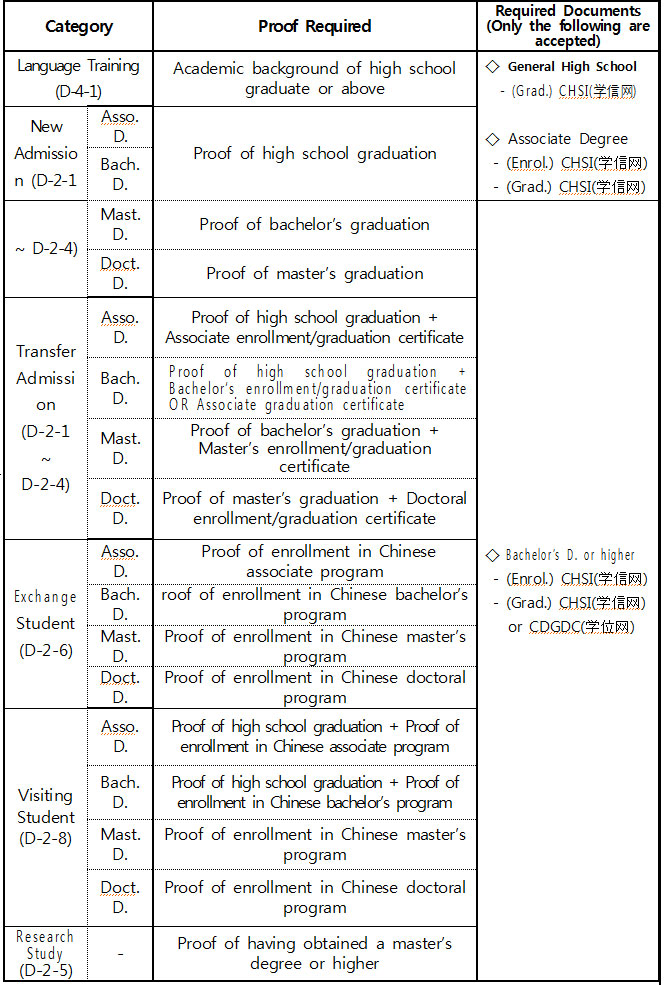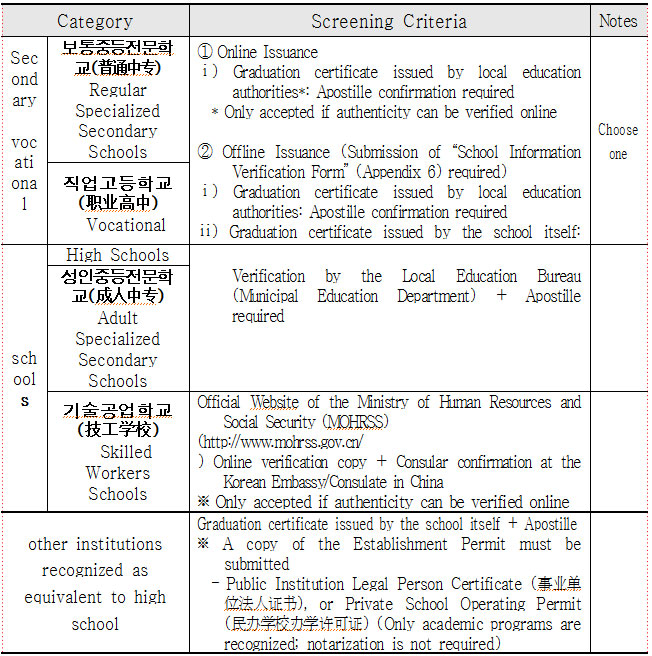Student(D-2)
| Eligible Applicants and Scope of Activities | Educational Institutions
Universities or academic research institutions that are junior college level or higher, established under the Higher Education Act or other special laws, and that meet the qualifications designated by the Minister of Justice. This also includes affiliated language institutes of such universities. Excluded Institutions (Not Eligible for Student Visa Status) The following institutions are not eligible for student (D-2) visa purposes: * Broadcasting universities, correspondence universities, broadcasting correspondence universities, and cyber universities (online universities) under Article 2, Clause 5 of the Higher Education Act * Lifelong education institutions under Article 2, Clause 2 of the *Lifelong Education Act * Vocational colleges offering "vocational training programs" under Article 2, Clause 5 of the National Lifelong Vocational Competency Development Act * Evening universities or graduate schools, except for specific evening degree programs where student visa eligibility is permitted * Graduate schools without daytime programs and evening specialized courses at junior colleges —only those that have passed prior screening by the relevant immigration office are eligible International Students Foreign nationals who are enrolled in regular academic programs or conducting specific research at the above-listed institutions fall under : * Student (D-2) visa category * Language Training (D-4-1, D-4-7) visa category Detailed Visa Subcategories Degree Programs (D-2) : * D-2-1 : Associate Degree Program (Junior College) * D-2-2 : Bachelor's Degree Program * D-2-3 : Master's Degree Program * D-2-4 : Doctoral Degree Program * D-2-5 : Research Program * D-2-6 : Exchange Student * D-2-7 : Work-Study Linked Program * D-2-8 : Visiting Student Language Training (D-4): * D-4-1 : Korean Language Training * D-4-7 : Foreign Language Training |
||||||||||||||||||
| Maximum Duration of Stay That Can Be Granted at One Time | 2 years
|
||||||||||||||||||
| Visa Types Eligible for Study Activities Without Separate Permission | ❍ The following visa holders may engage in study activities without separate permission :
Diplomatic (A-1) to Agreement (A-3), Culture and Arts (D-1), General Training (D-4-2), Journalism (D-5) to Trade Management (D-9), Professor (E-1) to Specific Activities (E-7), Non-Professional Employment (E-9), Maritime Crew Employment (E-10), Visiting and Cohabiting Family (F-1) to Marriage Migrant (F-6), Refugee Applicant (G-1-5), Humanitarian Stay Permit (G-1-6), Employment Visit (H-2), and other visa holders who have been granted permission to engage in study activities outside of their designated status (D-2). ※ Study activities are permitted without a separate permission process as long as they do not interfere with the original purpose of stay. ※ Eligible visa types for language training: All legal stayers, regardless of visa type. ※ Holders of E-9 (Non-Professional Employment), E-10 (Maritime Crew Employment), and G-1-5 (Refugee Applicants) visas may participate in study activities without separate permission; however, they cannot change their visa to a D-2 (Student) visa for continued study once their current stay expires. They must leave the country and re-enter with a new visa (Certificate of Visa Issuance). ❍ Holders of the Working Holiday (H-1) visa can engage in study and training activities without separate permission, if their country’s agreement with Korea imposes no restrictions. However, nationals of Australia, Taiwan, Ireland, Denmark, Canada, and Hong Kong must comply with their respective agreements and may require permission if their study exceeds the scope allowed. Country-specific limitations : * Australia : Cannot enroll in formal courses other than Korean language. * Taiwan : Cannot enroll in formal courses other than language programs or seminars aimed at cultural understanding. * Ireland : Cannot participate in training or academic courses, but Korean language courses up to 6 months are allowed. * Denmark : May participate in training or educational programs for up to 6 months. * Canada : Korean language study permitted for up to 3 months. * Hong Kong : Short-term courses permitted for one program, up to 6 months. |
||||||||||||||||||
| Activities Outside of Permitted Stay (Visa) Status | 1. Special Permission for Student Researchers in Science and Technology
Eligibility for Permission Graduate (Master’s or Doctoral) students currently enrolled or who have completed coursework and wish to work as a “student researcher” under an employment contract at a **government-funded research institute** other than their university. Scope of Government-Funded Research Institutes * Research institutes established under Article 8 of the *Act on the Establishment and Operation of Government-Funded Science and Technology Research Institutes. * Specific research institutes under Article 3 of the *Enforcement Decree of the Act on the Promotion of Specific Research Institutes. * Research centers under Article 14 of the *Special Act on the Establishment and Support of the International Science and Business Belt. ※ Students at UST (University of Science and Technology) or KAIST are permitted to receive stipends for participating in research projects at their university without needing separate permission. Required Documents * Employment contract * Copy of the research institute's business registration certificate * Application fee Important Notes * Students with a D-2 (Student) visa cannot engage in research activities under a "Researcher" visa. * D-2 visa holders are not permitted to work as researchers at private companies (including university-industry cooperation foundations) without a change of status. * Dispatch or support work at external research institutes not affiliated with the university is strictly prohibited. 2. Part-Time Employment (Arbeit) for Foreign Students A. Basic Principles * Only simple part-time jobs typically undertaken by students are allowed. * Specific employment types listed in Enforcement Decree of the Immigration Act [Appendix 1-2] are subject to individual guidelines (e.g., Presidential English Volunteer Scholarship, conversation instructors, professional translation/interpretation, etc.). * Private tutoring is strictly regulated due to its specific nature (location, target audience, etc.). Permission Process : 1. Prepare an employment contract (standard format, including hourly wage). 2. Fill out the "Part-Time Employment Confirmation" form (provided by the university's international student office). 3. Submit application (with supporting documents) online or in person. 4. Approval/Denial (sticker attached to foreign registration card or printable approval letter online). B. Eligibility * Must have a certain level of Korean proficiency and be verified by the university's international student advisor. * Applicable for D-2-1 to D-2-4, D-2-6, D-2-7 * D-4-1, D-4-7 (language training) and D-2-8 (exchange students) : Eligible only after 6 months from entry or status change * Students granted exceptional stay due to failure to graduate are not eligible * Exception: Thesis-writing students in graduate programs (Master’s/Ph.D.) may be permitted * Students with delayed graduation due to poor grades or low attendance are not eligible * Weekly working hour limit : 30 hours * No unlimited work allowed during holidays, weekends, or school breaks C. Permitted Working Hours by Program & Language Ability (Effective July 2023)  ※ English Track Program: Regardless of year level, applicants who hold an English proficiency certificate of at least TOEFL 530 (CBT 197, iBT 71), IELTS 5.5, CEFR B2, or TEPS 601 (NEW TEPS 327) are eligible. Applicants from countries where English is an official language are exempt from submitting such certificates. Permitted Fields (Examples) : * General translation/interpretation, food service assistance, office support * Tourism assistance, duty-free shop sales * Not allowed : Manufacturing, construction (except those with TOPIK Level 4 or higher) * Seasonal part-time or full-time work allowed * Internship in E-1\~E-7 fields during vacations is allowed (if qualifications are met) Note : If the place of work changes, a new permit must be obtained. D. Approval Criteria * Previous semester GPA below C (2.0) or language course attendance below 90% → not eligible * Applicants who violated permit conditions or were previously flagged → not eligible * Not allowed : * Professional fields (E-1 to E-7), non-professional employment (E-9, E-10) * Teaching minors or working in educational institutions for children (exceptions apply) * Special employment types: delivery, courier, substitute driving, insurance agents, visiting instructors, door-to-door sales * Dispatch work, outsourcing, remote or distant jobs E. Application Guidelines * D-4 (Language Trainees): Up to 6 months during stay, at 1 workplace * D-2 (Students) : Up to 1 year during stay, at up to 2 workplaces within allowed hours F. Required Documents * Passport, Alien Registration Card, Application Form * Part-Time Employment Confirmation for Foreign Students * Transcript or Attendance Certificate (can be omitted if verifiable online) * Proof of Korean proficiency (if applicable) * Copy of employer’s business registration, standard employment contract * Confirmation of compliance with part-time work conditions (if applicable) G. Special Cases (No Permission Required) * Activities not affecting core visa purpose : receiving stipends, awards, or daily compensation H. Penalties for Violations * Construction-related violations: Deportation upon first offense (entry ban deferred) 3. Income-Generating Research by D-2 Students At the Home University : * Participation in academic/research internships: No separate permit required * Participation in non-academic research/internships : Permit required Outside the Home University : * Academic-related research/internship : Permit required * Non-academic research/internship : Requires E-3 activity permit 4. Field Training Semester Programs * Standard or mandatory training under the * University Field Training Semester Guidelines : No permit required * Voluntary internships : Permit required 5. Employment Permit for Spouses of D-2 Students Spouses of D-2 visa holders may work only after obtaining permission for activities outside their visa scope, and not in unskilled labor sectors. |
||||||||||||||||||
| Change or Addition of Workplace | ❍ Not applicable
※ For holders of non-profit visa statuses such as Culture and Arts (D-1), Student (D-2), General Training (D-4), changes in their affiliated institution or organization (including name changes), and for holders of Reporting (D-5), Religion (D-6), Residency (D-7), Business Investment (D-8), Trade and Management (D-9) visas, if the name of their affiliated institution or organization changes, they must report the change of foreigner registration information under Article 35 of the Act (Enforcement Rule Article 49-2). |
||||||||||||||||||
| Granting of Residence Status | ❍ Not applicable | ||||||||||||||||||
| Approval for Change of Residence Status | 1. Approval for Change of Residence Status to Student (D-2)
a. (Basic Principle) Change of status is allowed for long-term residents legally staying in Korea after foreign registration; however, change of status is generally restricted for short-term residents (B, C visa categories). Exceptions apply in the following cases : ① Among registered foreigners, those holding qualifications other than Technical Training (D-3), Seasonal Labor (E-8), Non-professional Employment (E-9), Seafarer Employment (E-10), and Humanitarian Stay Permission (G-1-6) are restricted from changing status. ② However, short-term legal residents under ① who plan to enroll in an educational course starting before their current stay period expires, and ③ meet at least one of the following conditions are exceptionally allowed to change status.
| ||||||||||||||||||





